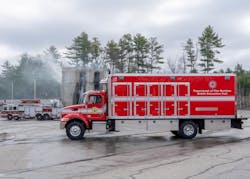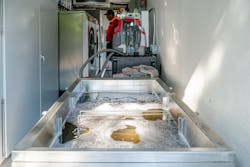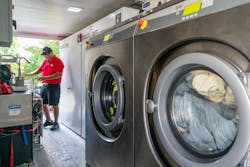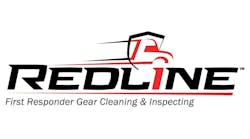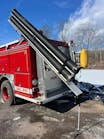The deployment by the Massachusetts Department of Fire Services (DFS), in partnership with RedLine Gear Cleaning, of one of the latter’s Mobile Extraction Units (MEU) provides the the DFS with improved capability to manage and clean all of the PPE for the Massachusetts Firefighting Academy (MFA).
The Department of Fire Service’s improved capability reduces exposure that results from handling turnout gear that’s used daily in live training fires and improves the process by which it carries out equipment maintenance.
Reducing cancer risk
The Department of Fire Services is home to the MFA, which is the primary training provider for new and veteran firefighters in the state of Massachusetts. The MFA operates three training campuses in the state. As the understanding of occupational cancer in the fire service has advanced in recent years, the MFA embraced its responsibility to help firefighters to reduce their personal cancer risk by integrating the principles of exposure reduction into every program and by establishing dedicated cancer-prevention initiatives.
MFA instructors emphasize to recruits the importance of proper gear cleaning after each exposure to smoke or flame throughout training, hoping to instill good habits that will last a lifetime. As well, all programs limit the amount of time that’s spent in turnout gear and highlight best practices for use, care and maintenance. Furthermore, the MFA developed “Taking Action Against Cancer in the Fire Service.” More than 7,000 Massachusetts firefighters took the course as of the writing of this article. It often is paired with the MFA’s skin cancer screening program. Dr. Christine Kannler, who is a dermatologist whose family experienced the effect of occupational cancer in the fire service, supervises the program.
The MFA also administered funding for full-body CT scans of firefighters at medical facilities. To date, it supported nearly 400 of these scans at no cost to the firefighters or their departments.
In the past two years, the department also administered state-funded grant programs that outfitted 140 Massachusetts fire stations with extractors for gear cleaning that are compliant to NFPA 1851: Standard on Selection, Care, and Maintenance of Protective Ensembles for Structural Fire Fighting and Proximity Fire Fighting.
Turnout gear cleaning
Until recently, cleaning turnout gear on a regular basis was a huge challenge on the three MFA campuses. Annually, the MFA conducts firefighter recruit classes with more than 700 career and call/volunteer students as well as countless other educational programs for veteran firefighters. This means managing more than 600 sets of turnout gear for instructional and support staff, which are used in thousands of live fire training evolutions. Each campus has one or two extractors, but space limitations have prevented the installation of more machines or drying racks. The extractor capacity at each of the MFA’s campuses is grossly insufficient for the activity level, and air-drying the gear is terribly inefficient and takes equipment offline for extended periods.
Each time the MFA explored solutions for the issue, the only one that emerged was to construct new buildings on each campus, which wasn’t feasible financially.
In early 2020, the department was introduced to the MEU approach to cleaning turnout gear directly at a fire station within a fully self-contained truck. The MEU is a turnout gear laundromat on wheels: Extractors, gear-drying capability and an ultrasonic cleaning station are inside of a custom-built truck that’s designed to be deployed anywhere. When the Assistance to Firefighters Grant (AFG) Program application period opened to state fire training academies for fiscal 2019, the MFA staff quickly made the acquisition of an MEU the top priority. In April 2021, the agency received the specially designed and built unit, received staff training and began moving it between the campuses to clean gear.
Mobile extraction unit
The custom 24-foot MEU body is specially designed and built by RedLine. (RedLine Gear Cleaning is firefighter owned and operated.) The body design allows for access to all components for ease of maintenance, repair and replacement of the modular equipment that the MEU carries.
A 70-kW power take-off generator provides power for the fully self-contained unit.
The interior is equipped with the lighting, heating, ventilation and air conditioning that’s needed for the operation.
Exterior features include solid step access to the interior; a ramp for bringing turnout gear and equipment on and off; area work lighting; and an awning for gathering and preparation of gear.
The interior work area hosts two 70-lb.-capacity extractors that were built specifically for mobile use; one propane-fueled tumble dryer; two drying cabinets; and an ultrasonic cleaning tank for cleaning of hard items, such as helmets, boots, SCBA and hand tools. Two 600-gallon water tanks and associated piping and pumps carry clean water and wastewater through the unit. Soap/detergent is dispensed via an automatic system.
The patent pending technology that’s within the truck can wash and dry as many as 40 sets of helmets, boots, gloves, jackets and liners in as few as 12 hours.
Hydrostatic pressure testing
The MEU contains a hydrostatic pressure-testing tool. In a typical year, the MFA spent $10,000 to have a private vendor conduct water barrier testing once on each set of gear. This expensive approach disrupted operations, because it took time for gear to be sent out, tested and returned. Gear now is tested on-site and returned to service the same day (if it passes the test). Gear that is older or used more frequently can be tested multiple times per year. This is a significant improvement over annual testing.
Measuring toxins
The MEU enables the academy to better understand the toxic byproducts that are created during live fire training where straw, pallets and gases are the primary fuel materials that are used for exercises.
Typical gear cleaning systems empty wastewater from the extractors into a sewer or septic system. The MEU’s clean water and wastewater tanks make it possible to sample water before and after it’s used. This provides a means to measure the type and amount of toxins removed from gear.
This data-gathering project has just begun, but MFA anticipates being able to share useful information with fire academies across the country soon.
Unusual events
The Department of Fire Service’s MEU will be used primarily for the MFA, but it also can be employed to assist Massachusetts fire departments when unique gear cleaning needs arise because of hazmat exposures or other unusual events.
Nearly every Massachusetts department has some NFPA 1851-compliant gear-cleaning capabilities. However, many of these departments have limited capacities and insufficient resources to dry equipment quickly. That extends the time that gear is out of service. Departments throughout the state of Massachusetts are working toward the goal of having two sets of gear for every firefighter. In the meantime, the MEU can address emergent needs that might affect department operations and clean 40 sets of gear in a single day to significantly reduce downtime.
The AFG
The objectives of this project are to reduce the level of carcinogens to which instructors, students and support staff at the MFA are exposed. The project increases the frequency with which turnout gear is cleaned and inspected and significantly improves the gear-cleaning and maintenance challenge for the department. When recruits graduate from the academy, they now return to their department with a clean set of gear to begin their fire service career.
The MEU’s capability to inspect, test and track PPE that’s worn by the staff and students at the three MFA campuses helps to produce a better understanding of the specific toxins that are created in an academy environment where straw, pallets and gases are the primary fuel materials. This will have a major effect on the health of the Massachusetts fire service.
The cost of the MEU and the financial challenges of the COVID-19 pandemic mean that, without the AFG, it would have been several years before the MFA could invest in an MEU.
Peter Ostroskey
Peter J. Ostroskey was appointed Massachusetts’ state fire marshal in February 2016 after serving four years as deputy state fire marshal. As head of the state Department of Fire Services, he oversees the Administrative Division, Massachusetts Firefighting Academy, the Fire Safety Division, the Hazardous Materials Response Program and the Special Operations Division. The Massachusetts State Police Fire & Explosion Investigation Unit, which includes fire investigators and the bomb squad, are assigned to him. He as has 30 years of experience in the fire service, having risen through the ranks from private to the position of fire chief in Uxbridge, MA. Previously, he was the deputy director of the Statewide Emergency Telecommunications Board, which now is known as the State 9-1-1 Department.
